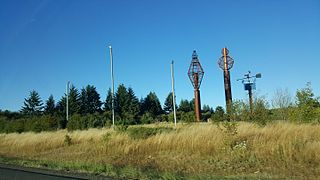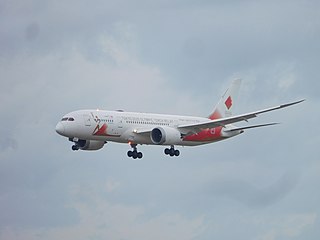
Special Olympics is the world's largest sports organization for children and adults with intellectual disabilities providing year-round training and activities to 5 million participants and Unified Sports partners in 172 countries. Special Olympics competitions are held every day, all around the world—including local, national and regional competitions, adding up to more than 100,000 events a year. Like the International Paralympic Committee, the Special Olympics organization is recognized by the International Olympic Committee; however, unlike the Paralympic Games, Special Olympics World Games are not held in the same year nor in conjunction with the Olympic Games.
The Olympic flame is a symbol used in the Olympic movement. It is also a symbol of continuity between ancient and modern games. Several months before the Olympic Games, the Olympic flame is lit at Olympia, Greece. This ceremony starts the Olympic torch relay, which formally ends with the lighting of the Olympic cauldron during the opening ceremony of the Olympic Games. The flame then continues to burn in the cauldron for the duration of the Games, until it is extinguished during the Olympic closing ceremony.

An eternal flame is a flame, lamp or torch that burns for an indefinite time. Most eternal flames are ignited and tended intentionally, but some are natural phenomena caused by natural gas leaks, peat fires and coal seam fires, all of which can be initially ignited by lightning, piezoelectricity or human activity, some of which have burned for hundreds or thousands of years.

The John F. Kennedy Eternal Flame is a presidential memorial at the gravesite of assassinated United States President John F. Kennedy, in Arlington National Cemetery in Virginia. This permanent site replaced a temporary grave and eternal flame used at the time of Kennedy's state funeral on November 25, 1963, three days after his assassination. The site was designed by architect John Carl Warnecke, a long-time friend of Kennedy. The permanent John F. Kennedy Eternal Flame grave site was consecrated and opened to the public on March 15, 1967.

The Tomb of the Unknown Soldier is a war memorial dedicated to the Soviet soldiers killed during World War II. It was designed by architects D. I. Burdin, V. A. Klimov, Yu. R. Rabayev and sculptor Nikolai Tomsky.

The Olympic and Paralympic Cauldron Plaza is located outside the southwestern corner of Rice–Eccles Stadium on the campus of the University of Utah in Salt Lake City, Utah. During the 2002 Winter Olympics and Paralympics, the stadium was known as Rice-Eccles Olympic Stadium and hosted the Opening and Closing Ceremonies. Currently, the plaza contains the 2002 Winter Olympics cauldron surrounded by several plaques displaying photographs and information related to the 2002 Games.

The Law Enforcement Torch Run (LETR) is a campaign to benefit the Special Olympics. It began in 1981 in Wichita, Kansas, and is the largest grass-roots fundraising movement for the Special Olympics.
Mrapen is an eternal flame in Indonesia that is the result of natural geologic activity.

The 2002 Winter Olympics torch relay was a 65-day run, from December 4, 2001, until February 8, 2002, prior to the 2002 Winter Olympics. The runners carried the Olympic Flame throughout the United States – following its lighting in Olympia, Greece, to the opening ceremony of the 2002 games at Rice-Eccles Stadium in Salt Lake City, Utah. The 2002 torch relay was also the 50th anniversary of the Winter Olympic torch relay, which was first run during the 1952 Winter Olympics.

The Eternal Light Peace Memorial is a 1938 Gettysburg Battlefield monument dedicated on July 3, 1938, commemorating the 1913 Gettysburg reunion for the 50th anniversary of the 1863 Battle of Gettysburg on July 3, 1913. The natural gas flame in a one-ton bronze urn is atop a tower on a stone pedestrian terrace with views from the terraced hill summit over about 400 sq mi (1,000 km2), and the flame is visible from 20 mi (32 km) away.

The Boy Scout Commemorative Tribute is a public artwork by American sculptor Donald De Lue, located on The Ellipse within The White House and President's Park in Washington, D.C., United States. The monument and fountain are maintained by the National Park Service. Sometimes referred to as the Boy Scout Memorial or Boy Scout Fountain, the Boy Scout Commemorative Tribute serves as a monument to the Boy Scouts of America.

Atlanta from the Ashes, more commonly known as The Phoenix, is a bronze monument located in Atlanta, Georgia, United States, symbolizing Atlanta's rise from the ashes of the Civil War to become a world city. The sculpture, dedicated in 1969, depicts a woman being lifted from flames by a phoenix, in reference to the phoenix of Greco-Roman mythology that was consumed by fire and rose from the ashes, just as Atlanta rose from the ashes after the city's infrastructure was burned by William T. Sherman's Union Army during the Civil War. The female figure has long hair and is seen nude above the waist, looking upward. In her raised arms she holds the legs of a gilded phoenix. The sculpture is mounted on a rectangular base. The monument is located in Woodruff Park, located in Downtown Atlanta.

The 2000 Summer Olympics torch relay was the transferral of the Olympic Flame to Sydney, Australia, that built up to the 2000 Summer Olympics. The torch travelled to various island nations as part of a tour of Oceania before beginning an extensive journey around Australia. For the first time the Flame was taken underwater, with a special flare-like torch taken on a dive down to the Great Barrier Reef. At the opening ceremony the cauldron was lit by Aboriginal athlete Cathy Freeman.

The Eternal Flame is a memorial in the Park of Friendship in Belgrade, Serbia. It is dedicated to the military and civilian casualties resulting from the NATO bombing of Yugoslavia in 1999 and symbolizes the resistance of the Serbian nation to the attack.

The Park of 28 Panfilov Guardsmen is an urban park located in east-central Almaty in the area surrounding the Ascension Cathedral. It is dedicated to and named after the Panfilov heroes which were the 28 soldiers of an Alma-Ata Infantry unit who allegedly died while defending Moscow from the German invasion during the Second World War. The group took its name from Ivan Panfilov, the General commanding the 316th division which, in spite of heavy casualties, believed at that time managed to significantly delay the Germans advance to Moscow, thus buying the time for the defenders of the city. An eternal flame commemorating the fallen of the World War II and the Eastern Front burns in front of the giant black monument of soldiers from all 15 Soviet Republics.

Gospodor Monument Park is a roadside attraction along Interstate 5 near Toledo, Washington, in the United States. It features four sculptures, collectively known as the Gospodor monuments, created in 2002. The tallest sculpture, meant to commemorate Mother Teresa, stands over 100 feet and features a gold painted wooden statue of Jesus. Another sculpture monument features a carving of Mother Teresa posed in prayer. Two additional towering artworks honor victims of The Holocaust, which features an eternal electric flame, and a 100-foot tall tribute depicting Chief Seattle, commemorating Native Americans and other indigenous tribes. Smaller memorials to historical figures, such as Susan B. Anthony, and a carved, wooden eagle encased in glass, were later added as the park expanded.

The 2020 Summer Olympics torch relay was held from 12 March 2020 and ended on 23 July 2021. After being lit in Olympia, Greece, the torch was handed over to the Olympic shooting Gold medallist Anna Korakaki, who became the relay originating Olympian woman of the 2020 Summer Olympics torch relay. It was then transported to Athens on 19 March by official airliner Japan Airlines. The Japanese leg began in Fukushima, and is scheduled to end in Tokyo's New National Stadium, the main venue of the 2020 Olympics. It makes a tour of Japanese cities, including all 47 prefecture capitals. The torch is even scheduled to go to two remote island groups which are part of Tokyo. The end of the relay was the finale of the 2020 Summer Olympics opening ceremony on 23 July 2021. Toyota, NTT, ENEOS, Nippon Life, JAL, ANA and Japan Post Holdings are the presenting partners of the relay, with the slogan being "Hope Lights Our Way".
The 2018 Asian Games torch relay preceded with a torch lighting ceremony on 15 July 2018 at the Major Dhyan Chand National Stadium in New Delhi, host of the first Asian Games. The flame was generated from a parabolic mirror directed straight at the sun.
The American Memorial to Six Million Jews of Europe, also referred to as the Warsaw Ghetto Memorial, is a public Holocaust memorial situated at Warsaw Ghetto Memorial Plaza in Riverside Park, within the Upper West Side of Manhattan, New York City. It is a monument to the Warsaw Ghetto Uprising and the six million Jews who were murdered in the Holocaust. Dedicated on October 19, 1947, it is one of the first memorials to the Holocaust in the United States.















